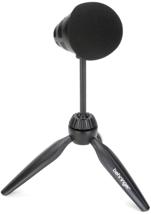*This library guide was adapted from the original resource created by Emily Thompson, director of The Studio at the University of Tennessee Chattanooga Library. Thank you!
So you've listened to podcasts and would like to start your own. There's more to it than just talking into a mic and hoping people will subscribe. More than anything, Podcasting is about storytelling. Look at the sidebars to the right to start figuring out what your show should sound like. We also recommend thinking "Beyond the 5Ws".

It may seem like podcasts are just people talking about things that interest them, but it's a good idea to narrow down your topic. It'll give you a direction once you finish the shows you already have ideas for.
Who is this for? How old are they? Are they someone who already knows a lot about the topic, or are they hoping to learn more? What other sorts of podcasts do they listen to? How are you going to get their attention and what can you do to hold it?
Essentially, every episode will need to be scripted, recorded, edited, and posted. Whether you're doing this with a team or by yourself, you're going to get organized. Consider if you have a ideas for seasons and episodes. The YouTube links below will get you started in organizing your podcast.
This will depend on your podcast's style. If you mostly want to talk about research and have conversations, your script may look more like a series of bullet points or an outline. If you're going for something more narrative, it may be a more traditional script with notes for sound effects. For an interview, it may just be a series of questions. The goal is to make sure you're prepared so you don't have to go back and record something else later. Preparation is key!
And don't forget to cite your sources in your script so you can put them in your show notes! This is much easier than going back to find them later.
You can borrow equipment at the ATU Media Production Labs that can help your podcast sound professional, available for one week check-out at the ATU Media Lab (RPL 210) on the second floor or the library.
The BU5 is a desktop USB mic with stand that just needs to be plugged into your computer. It's perfect if you have a quiet room set up and just want to talk into a mic.

The AT2020 is a high quality cardioid condenser microphone that provides crisp, clean vocal recordings for music or podcasting. This microphone offers professional results at affordable prices for the DIY musician or podcaster; however, you don't have to buy one because the ATU Media Lab has them for a one week check-out with a valid Tech ID.

This wireless lavalier microphone kit has 1 receiver, 2 transmitters, and USB C/A and Apple Lightening adapters. The kit is plug-and-play when used with your phone, tablet or laptop.

All of these programs are available on computers in the ATU Media Lab (RPL 210), Audio Lab (RPL 204), and Video Lab (RPL 203) on the 2nd floor of the ATU Library.

Audacity is an audio editor that works for both Windows and Macs. It's very basic, but free to download and can do most of the things you need to get a podcast up and running.
Garage Band is a free music production software (DAW) that comes with Macs. It's not available for Windows. Like Audacity, it's basic, but a solid choice if you don't want to spend money getting started.
Garage Band Guide (University of Tennessee Chattanooga)
Garage Band and Podcasting - Buzzsprout
www.youtube.com/watch?v=mATGO5ayrzc
Part of the Adobe Creative Suite, Audition is a professional audio editor with all the bells and whistles, but no MIDI capabilities. It has more of a learning curve than Audacity or Garage Band, but it's what the pros tend to use.